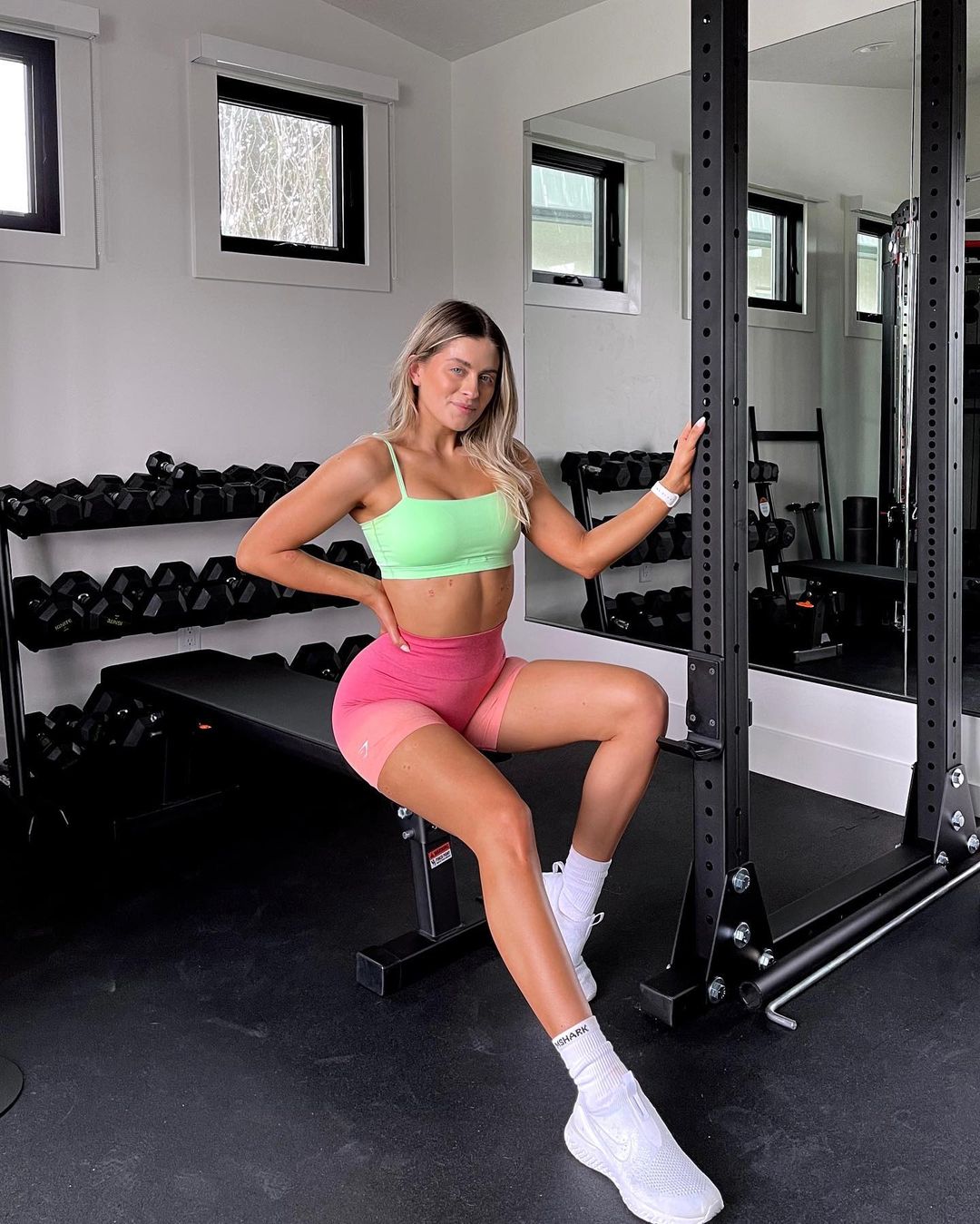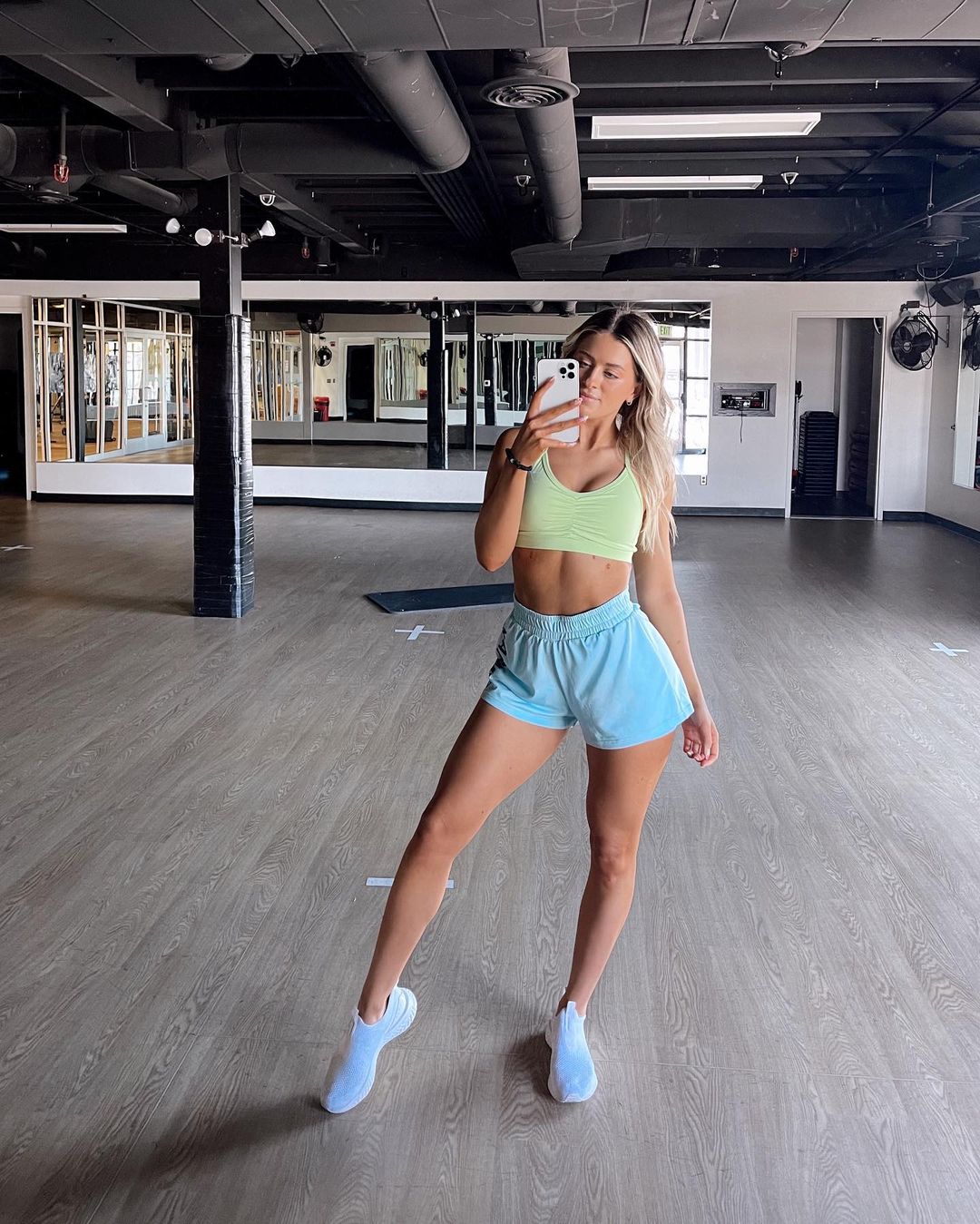We assume that the people responsible for influencing our wellbeing are always at their most healthy. But what happens when influencers face a health crisis?
Warning: this article contains references to suicide that some readers may find triggering.
In June 2021, Whitney Simmons made 17 posts to her Instagram grids. They consisted of workout videos, healthy recipes, funny reels about the life of a gym-goer and photoshoots from her swimwear line. In all of them, she was the vision of holistic wellbeing: grinning to the camera, dressed in chic activewear sets with motivational captions about self-care and seizing the day. That same month, she considered driving her car into a wall.
For those unfamiliar, Simmons is a fitness influencer with 3.2 million followers on Instagram, three clothing lines in collaboration with Gymshark – one of the most lucrative activewear brands in the world – and her own workout app, Alive. She’d built a career out ofsharing her healthy lifestyle and encouraging others to do the same. She is perhaps one of the few influencers who is truly influential – her comments are flooded with thanks and appreciation from other women who have followed her workouts or turn to her for positivity. She has inspired hundreds, if not thousands, to make positive lifestyle changes.
Simmons had never shied away from including mental health in her content, either. Her signature catchphrase on YouTube has always been, “It’s a beautiful day to be alive”, and her own fitness ‘journey’ actually began in university, when she found herself struggling with a low mood. Her dad took her to the gym, and she found huge benefits in the endorphin rush of lifting weights. “Fitness started out as a form of therapy for me, and for so many years that was where I found my peace. I’ve always been an open book about that,” Simmons explains over Zoom. “But this year, for the first time, the gym was more detrimental to my mental health than anything else.”
You may also like
Strength training for my mental health: why my workouts aren’t for my body, but for my mind
It happened after Simmons lost her friend to cancer. “I found out about his passing while I was in the gym. The place that was my safe place and my true escape ended up being a place I couldn’t go to because all I could think about when I was there was my friend passing away. I would drive to the gym and just sit outside in the car and cry,” she says. As her mental health worsened, she began not being able to leave her bed, relying on Airhead sweets to sustain her.
When she began having suicidal thoughts, she sought professional help. “Over the last year I’ve been diagnosed with severe depression and an anxiety disorder,” she tells Stylist. “Those are the illnesses that I’ve been trying really hard over the last six or seven months to work through, and to figure out the best route for me when it comes to living a healthy lifestyle alongside my mental health and mental illness.”
How to balance fitness and mental illness
Understandably, she chose to do this behind the scenes rather than documenting the process on her social profiles. “For the first time in my life, I felt like I needed to keep this to myself and make sure that I was in a place where I felt that I could talk about it without crying. I needed to have professional help so I could work on myself before I came to my audience,” she says. But this was a double-edged sword: privacy was important, but how do you continue to be a fitness influencer – and receive daily praise for being a health inspiration – when you are the illest you’ve ever been?
Simmons doesn’t have an answer for that. “You feel so much pressure when you are living a healthy lifestyle to continue doing that. You want to push yourself to continue because you know that going to the gym and working out has helped you so tremendously in so many aspects of your life before,” she says.
From a practical point of view, she admits that the joy of “content creation means you can shift and try new things”. While many workouts were filmed ahead of time, she “focused on short, funny reels or home workouts or recipe videos when I couldn’t get to the gym.”




But navigating the larger engagement with her audience hasn’t been so smooth. She’s always had support for her mental health conversations, but others don’t take well to the person who seemingly has it all talking about their bad days. Many accuse her of just “getting out of bed on the wrong side”: “Even recently, when I talked on my YouTube about grief, I got fired off in the comments about how grief and depression were two separate things and I might be grieving somebody, but I’m not depressed. Little did they know that I had just been diagnosed with severe depression,” she says.
“I’ve actually never seen mental health as ridiculed as I have this past year. I don’t think it’s personal, but I feel like, coming out of the pandemic, so many more women are talking about their mental health. With that comes a lot more people from the outside mocking it.”
You may also like
Mental health: this candid Instagram post explains why a depression diagnosis should be seen as a positive, not a negative
It wasn’t until this September that she first posted explicitly about her diagnosis and ongoing journey with her mental illness. Her Instagram post, which has received nearly 200,000 likes, was captioned: “I lied to myself so many times this year telling myself “I’m fine” over and over again until the day hit where I no longer wanted to be here. Isn’t that ironic? The person who says everyday “it’s a beautiful day to be alive” no longer felt there was a reason to be alive anymore. It was the day I knew I needed to seek professional help.”
Speaking out has been worth it, she says. “I feel like until you go through these illnesses you don’t realise how different mental health and mental illness are. Now, I can really deeply understand somebody else and what they’ve gone through because I’m going through it myself. I always felt so alone, but talking about it just brings a whole other level of connection and understanding with my audience.
“At one point in my life, going to the gym was enough for me. And then it wasn’t enough for me anymore. I had to figure out how to better myself before I could even step back into the gym.”
How she relates to – and posts about – health and fitness has changed. “Going outside and taking daily walks is a big part of my toolkit – like walking has changed my life. I’m very worried now that winter’s coming because I’m, like, what are we gonna do? My dogs will get so needy if I stop taking them out for two-hour walks,” she laughs.
She also finds it important to “start my day with gratitude and take that time for myself to really reflect on how I’m feeling. Since losing my friend I feel like every day is so special and it’s so important.”
But it is the non-Instagrammable things that have really made the biggest impact. “Going to therapy and making sure that I’m getting enough sleep are crucial. I’m putting huge emphasis on trying to change my sleeping habits. I used to be a powerhouse; five, six hours sleep and I was ready to go. Now I really need eight hours to reduce my stress levels and to really help me be OK for the next day.
“Those things are definitely not glam, they’re not always fun, and they all seem so small and minor, but they really do all add up and really have made a huge change in my life.”
You may also like
Cardio vs strength: “Strength training has changed how I view my body image, mental health and exercise goals”
So where does it leave her? Being the woman known for living in peak health, then suddenly diagnosed with an illness that changes everything? “I think I’m such a different person now this year than even I was at this time last year. And I think that that is such a testament to life. The things that have happened to me are just part of me now. It’s my story, a building block in my life, and it was very hard for me but I feel like it’s opened up a whole new conversation and it’s made me who I am today.”
It’s very clear that health is never just about the images you post to your Instagram grid. We knew that already. But let Simmons be the proof that health is never just a picture.
For those struggling with their mental health or having suicidal thoughts, Samaritans (116 123) operates a 24-hour service available every day of the year in the UK. If you prefer to write down how you’re feeling, or if you’re worried about being overheard on the phone, you can email Samaritans at [email protected].
Source: Read Full Article
